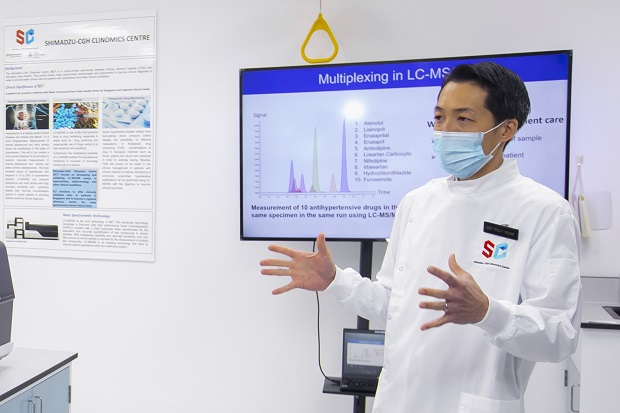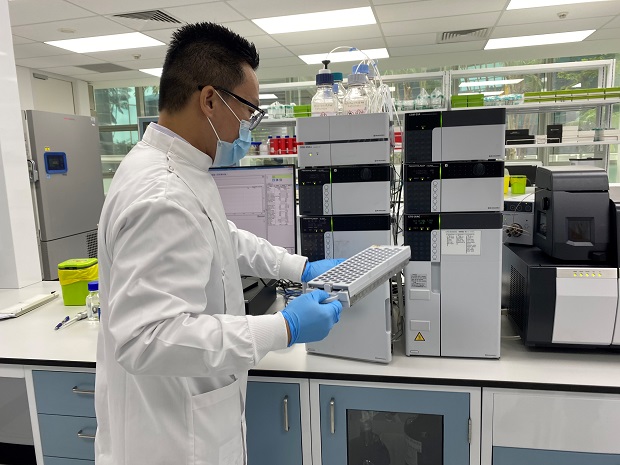<<Dr Daryl Hee and Clinical Assistant Professor Troy Puar at the
Shimadzu-CGH Clinomics
Centre, a new clinical
laboratory equipped with
mass spectrometry technology. (Photo: Singapore Press Holdings Limited)>>Tests by a new clinical laboratory will improve
the accuracy of treatment and enhance care for
patients with hypertension.
Patients with hypertension can look forward to receiving more precise and targeted treatment from the get-go, with the opening of the Shimadzu-CGH Clinomics Centre (SC3), a partnership between Changi General Hospital (CGH) and Japanese technology firm Shimadzu (Asia Pacific).
Hypertension, or high blood pressure, is a relatively common condition here — one in four adult Singaporeans has it — but not much data is available on the type of hypertension they may have.
Some patients suffer from a type of hypertension that is caused by excessive tightening of the blood vessels, while others may develop this condition due to an excess in salt and blood volumes. Up to a fifth of patients may have a curable form known as primary aldosteronism, or Conn’s syndrome, which is caused by an over-secretion of the hormone aldosterone.
“Medicines correct high blood pressure either by relaxing the blood vessels, or by removing excess salt from our body. As such, identifying the type of hypertension will enable us to deliver more precise and personalised medicine,” said Clinical Assistant Professor Troy Puar (below), Consultant, Department of Endocrinology, CGH.

A satellite laboratory of CGH, the SC3 is equipped with mass spectrometry technology that will enable easy and quick identification of hypertension types using liquid chromatography upon validation. With just a small sample of blood, the laboratory will be able to precisely measure levels of the renin and aldosterone hormones, which will determine the spectrum of hypertension a patient has.
Currently, such accurate analysis can only be done by sending patients’ blood samples to laboratories with mass spectrometry capabilities in the United States. This is costly, and takes up to two weeks for the results to be available.
Local laboratories mostly use immunoassay testing to measure vitamins, hormones and antibodies, but these do not provide the accuracy needed for renin and aldosterone hormones.
“Different hormones often share similar structures, and immunoassays testing may give false results because of this. Particularly for aldosterone that is in low concentration, this can be a problem. Measurements of aldosterone with mass spectrometry gives us the certainty we need to treat patients confidently,” said Dr Puar.
With SC3 set up in Singapore, results will take only about two days to be ready. The mass spectrometer directly measures the test compound, which is very specific and is able to give accurate results.
“Doctors will be able to prescribe the most appropriate medication personalised for hypertension patients from the start, preventing the disease from worsening,” said Dr Puar.
“The new laboratory can also test for multiple compounds using the same sample. This means the patient does not need to undergo multiple blood-drawing procedures, thereby improving the patient experience,” added Dr Daryl Hee (below), Senior Manager, CGH, who is in charge of SC3.

The lab will also be used to measure the concentrations of the various hypertension medications from the patient’s urine samples. As there is no other marker to indicate how well controlled a patient’s blood pressure is over a period, the identification of medications using mass spectrometry will give doctors a good indication as to whether patients are adhering to their medication schedule.
“There are instances where some patients’ blood pressure may still not be controlled even after medication. Often, these patients would be referred to specialists, who may then order further tests to investigate the issue. The urine test will be useful in identifying patients who may not be complying with their medication regimes,” said Dr Puar.
The laboratory is also working towards processing samples from the region and for other chronic diseases in future. It hopes to serve as a regional referral centre in Asia Pacific for developing mass spectrometry solutions.
Get the latest updates about Singapore Health in your mailbox! Click here to subscribe.
Tags:
;
;
;
;
News Article;Publication;
;
SingHealth;Changi General Hospital;
;
Singapore Health;
;
;
;
;
Singapore Health
